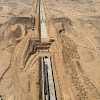Saudi economy driven by diversification under Vision 2030
Saudi Arabia’s mergers and
acquisitions (M&A) landscape is witnessing a major transformation, playing
a crucial role in advancing the Kingdom’s Vision 2030 goals. With 224 deals
valued at $7.6 billion in the first half of 2024—a 19% year-on-year
increase—the M&A boom is driving sectoral diversification, fostering
innovation, and strengthening the country’s global investment appeal.
At the heart of this momentum is the
General Authority for Competition (GAC), which reported a 17.4% rise in
approved economic concentration requests in 2024. These approvals signal a
strategic shift toward consolidation, aimed at boosting competitiveness,
curbing monopolistic practices, and enhancing market efficiency.
“This surge in deal volume,
alongside regulatory approvals, reflects businesses’ intent to scale and enhance
market positioning, directly supporting Vision 2030,” said Imad Matar, Deals
Advisory Leader at PwC Middle East.
The sectors leading this
transformation include technology, energy, and industrial manufacturing. PwC’s
TransAct Middle East Mid-Year Update highlighted technology alone accounted for
$1.4 billion in deal value. These trends are being driven by both domestic and
international players seeking to capitalize on the Kingdom’s regulatory reforms
and non-oil growth initiatives.
Read More Saudi rulers’ vision standing out
as an example of successful economic diversification
Martin Pavlica, Principal at Kearney
Middle East, emphasized the broader economic impact:
“These developments are reshaping
Saudi Arabia into a dynamic, competitive economy. We're seeing a stronger
capital market and rising IPO activity—trends we expect to accelerate.”
Strategic Implications for Local and
Global Investors
The favorable regulatory environment is attracting foreign direct investment
(FDI) while enabling local businesses to pursue scale, efficiency, and
innovation. Elif Koc, Partner at Bain & Company, noted that strategic
M&A—such as Aramco’s $8.9 billion acquisition of Rabigh Refining &
Petrochemical—underscores Saudi Arabia’s drive toward market efficiency and
transparency.
“With improved regulatory clarity,
Saudi Arabia is becoming a magnet for capital inflows and a hub for corporate
consolidation,” Koc said.
Giuseppe Netti, Head of MEA Sales at
Bloomberg, added that consolidation is fostering a more competitive,
innovation-led ecosystem.
“This momentum, if managed
strategically, will lead to sustainable long-term growth, rather than just
short-term consolidation gains.”
Read More Vision
2030 playing a crucial role in business growth and diversification in Saudi
Arabia
Vision 2030 Alignment: Enabling
Economic Diversification
The M&A wave is deeply interwoven with Vision 2030’s pillars—economic
diversification, private sector enablement, and FDI attraction.
“M&A in sectors like tech,
manufacturing, and logistics is unlocking economic potential and expanding the
private sector’s GDP contribution,” said Javier Herrera, Partner at Kearney.
Outbound deals are also on the rise,
with a noticeable shift toward European assets, indicating the Kingdom’s
growing footprint in global markets. Koc emphasized this international pivot:
“M&A is driving job creation,
tech transfer, and private sector dynamism—core elements of Saudi’s non-oil GDP
growth strategy.”
Looking Ahead: A Future-Shaping
Force
As Saudi Arabia accelerates industrialization, localization, and tech-driven
innovation, M&A is set to remain a central pillar of transformation. The
$100 billion AI initiative is expected to further fuel cross-border deals,
especially in advanced tech sectors like cloud computing and manufacturing.
“This evolving M&A landscape
will bolster Saudi’s global competitiveness and reinforce its status as a
regional investment leader,” said Matar.
Read More IMF:
Saudi Arabia's economic growth driven by diversification efforts
Koc added that increased investments
in R&D, renewable energy, and advanced manufacturing are pushing the
Kingdom toward becoming a high-tech, knowledge-based economy.
From Bloomberg’s Netti:
“Saudi Arabia’s M&A trajectory
points to an increasingly innovation-driven, globally competitive economy. The
key will be ensuring these deals deliver long-term value, fuel
entrepreneurship, and deepen capital markets.”
Conclusion
Saudi Arabia’s M&A boom is more than a flurry of corporate activity—it’s a
strategic lever in reshaping the Kingdom’s economy in line with Vision 2030. If
the momentum continues with a balanced regulatory approach, Saudi Arabia is
poised to become a global leader in investment, innovation, and economic
resilience.
Source: Arab News









0 Comments